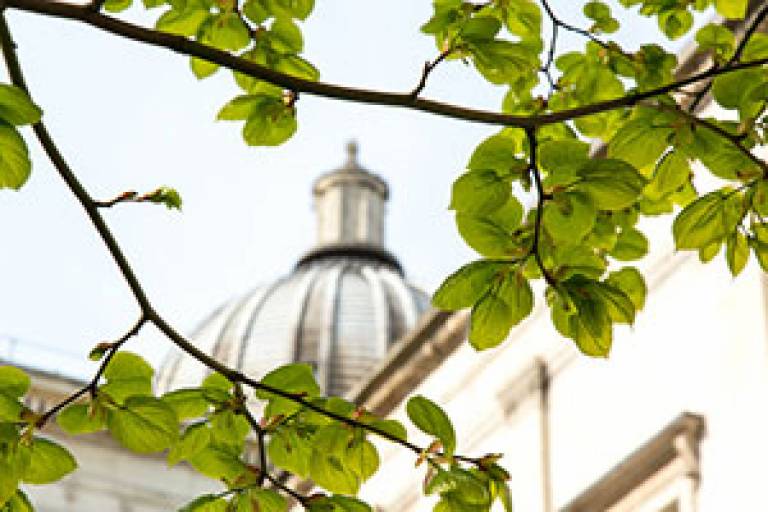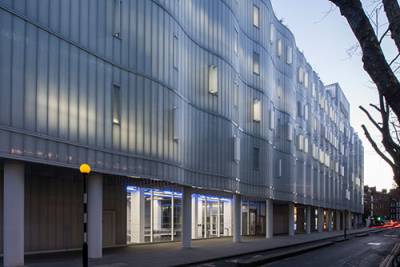Provost's View: Rising to the challenge of sustainability
9 November 2016
Sustainable development is one of the major global themes of the 21st century and one that challenges our economic model of growth and development, the way in which our society functions and our custodianship of the earth's resources.

Climate change, social inequality, global health and wellbeing, increasing urbanisation, to name but a few, are all significant issues that jolt us to look more closely at the sustainability of our actions.
Indeed, there is a noticeable increase in the number of press articles on each of these issues.
Why does this matter? Well, CO2 modelling suggests that climate change could result in much more severe weather events and extreme temperatures. Last week, I read that CO2 levels in the atmosphere are expected to be above 400 parts per million on average for the first time in 2016.
In the UK, that includes wetter winters with more heavy downpours, and hotter drier summers - increasing flooding, impacts on critical infrastructure and potential effects on health.
Many people regard climate change as an environmental issue but the effects will more than likely impact on our economy, our society and our health.
Clearly, climate change challenges us to find a more sustainable pathway for our society.
In the face of these challenges, solutions are coming forward. The Paris Agreement in December 2015 represented a milestone in seeking a global response to climate change with all nations agreeing the framework for coordinated global action.
In September, the US and China, the world's biggest emitters of CO2 confirmed that they will both ratify the agreement.
The role of UCL in a sustainable society
UCL has an important role to play in driving sustainable development forward. Indeed, I would argue that it is at the forefront of work to address these issues of sustainability through its research, teaching and enterprise activities.
Our institutional strategy, UCL 2034 sets out our commitment both to developing cross-disciplinary solutions to global problems through UCL Grand Challenges and to initiating collaborative and transformative research through the UCL research domains.
Among other things, UCL has been involved in drafting international climate change reports; we are actively engaged in public policy; and we are regularly publishing papers on sustainability issues, including the groundbreaking Lancet Commission on Global Health and Climate Change.
I strongly believe that a UCL education is one that gives our students opportunities to both explore issues of sustainable development and to be involved in the solutions - through experiential learning.
We achieve this through an expansion of work placements and internships; new opportunities to study; volunteering and enterprise projects; and challenging and inspiring interdisciplinary courses, such as the Global Citizenship Programme and the Change Makers programme.
It is through offering these opportunities that we also hope to find young entrepreneurs, such as Arthur Kay, whose bio-bean project reuses ground coffee beans as a biofuel and has gone on to win awards both nationally and internationally.
As much as we are achieving in research and teaching, addressing sustainability is also about leading by example - ensuring that our buildings, operations and services are equally tackling the sustainability challenges.
A challenge for the whole UCL community
Action from the whole UCL community will be essential if we are to achieve a more sustainable future.
The UCL Sustainability team is working with both staff and students to improve both knowledge and engagement with the sustainability agenda. This is not just about reducing our impacts but also making sure that we manage risk and ensure compliance with environmental regulations.
We have Green Champions working within most departments to help drive the sustainability measures forward and there is training provided to those that want to get involved.
And student engagement is thriving whether in the form of vegetable growing at Bentham's Farm to cycle repairs through Dr Bike.
It's encouraging to see so many of you taking part in the Green Impact initiative - which provides a framework for action on everything from waste and energy efficiency to greening our laboratories.
We had more than 32 departmental teams completing the programme last year and several teams undertaking their own environmental improvement projects in their departments.
The Green Impact programme for 2016-17 has just been launched, with a new Green Labs programme; and funding available for departments with innovative ideas to reduce energy, water or waste.
We all have a responsibility to look at what we do and how it can make things more sustainable, and I encourage you all to get involved.
Creating a sustainable campus
Such a major capital programme presents an unparalleled opportunity to make a sustainable campus that showcases the best of UCL's research on the built environment.
I was extremely pleased to see that the new Sainsbury Wellcome Centre has gained UCL's first BREEAM Excellent award for an academic building and sets the benchmark for other buildings in design or under construction.

UCL is targeting BREEAM Excellent or above for all new buildings and major refurbishments, with the New Student Centre on track to achieve BREEAM Outstanding. What this means in practice is more efficient and healthier buildings; through integrating renewable energy, increasing natural daylight, reducing water and improving internal air quality.
It is not just about our buildings. We are also influencing the way that the sector designs and builds.
In 2015/16, the UCL Sustainability team led the development of a new sector-wide environmental assessment methodology for small refurbishment projects, working alongside the Royal Institute of Chartered Surveyors (RICS) to develop Ska HE.
The scheme, which was launched at UCL in June 2016, focuses on the reuse of materials and raises the bar in other areas such as energy efficiency and occupant wellbeing.
Reducing our carbon emissions
Driving towards a sustainable estate will also help us free up funds for the institution to spend on teaching and research.
Over the past five years, projects such as new boilers and LED lighting have reduced carbon emissions by 2,500 tonnes per year and delivered £1.23 million in avoided cost on UCL's energy bills.
In 2016, UCL Council approved a new Carbon Management Plan, Degrees of Change, which sets an ambitious 15% target for carbon reduction by 2020 and includes longer-term targets for the first time, requiring savings of 50% by 2034.
The level of engagement in developing the plan (more than 3,000 people consulted) speaks volumes for the importance of this issue to you all.
And action is leading to improvement: carbon emissions in 2015/16 were 66,438 tonnesCO2e - 2.3% lower than 10 years ago, despite significant growth in both the UCL estate and our activities.
Sustainable operations and services
Work is still underway to drive sustainability and efficiency into UCL's operations. Waste figures indicate an improvement in the level of recycling (up from 59% in 2014/15 to 66% in 2015/16).
Our new Logistics programme has reduced the number of delivery vehicles entering the campus, making a safer and more pleasant environment for staff and students as well as minimising our impact on local air quality.
Next steps
We are also going to be reviewing our approach to sustainability over the next year. The strategy, which was approved by Council in 2013, will be refreshed with new targets and a focus on three to four big ideas.
Again, I hope you will all take part in the development of the strategy and work with the Sustainability team to help us reduce our impacts, as well as continue to develop our own world-class reputation in sustainable development.
This is a fantastic opportunity to demonstrate our commitment to addressing real world problems and I look forward to seeing how the UCL community rises to this challenge.
Professor Michael Arthur
President & Provost
 Close
Close

